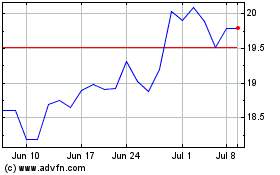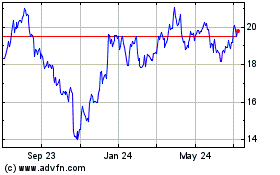2nd UPDATE:Feinberg Won't Ask Firms To Return $1.6 Billion In Payouts
July 23 2010 - 2:40PM
Dow Jones News
U.S. "pay czar" Kenneth Feinberg on Friday declined to seek
repayment from 17 financial firms that doled out $1.6 billion in
"ill-advised" executive compensation during the height of the
financial crisis, saying to do so would be unfair to the companies
and could trigger private lawsuits and additional congressional
investigation.
Feinberg announced Friday that he had found 17 firms--including
Goldman Sachs Group Inc. (GS), J.P. Morgan Chase & Co. (JPM)
and Citigroup Inc. (C)--made inappropriate bonuslike payouts to top
executives in late 2008 and early 2009 even as the companies were
receiving taxpayer assistance. Feinberg, the Obama administration's
special master for compensation, said he targeted this pool of
payments both for the sheer amount--some individual payouts exceed
$10 million, he said--and the lack of reasonable rationale for
their payment.
Other firms Feinberg criticized as having poor judgment included
American Express Co. (AXP), American International Group Inc.
(AIG), Bank of America Corp. (BAC), Boston Private Financial
Holdings Inc. (BPFH), Capital One Financial Corp. (COF), CIT Group
Inc. (CIT), M&T Bank Corp. (MTB), Regions Financial Corp. (RF),
SunTrust Banks Inc. (STI), Bank of New York Mellon Corp. (BK),
Morgan Stanley (MS), PNC Financial Services Group Inc. (PNC), U.S.
Bancorp (USB) and Wells Fargo & Co. (WFC).
But he stopped short of saying any of the firms violated the
public interest, the highest censure allowed by the law mandating
his review. None of the firms violated any law or regulation when
they made the payouts, Feinberg told reporters during a briefing
Friday. His study covered the five-month window during which firms
were getting government assistance but policymakers had not yet
enacted executive compensation restrictions. Those rules came into
force in early February 2009.
The payments "were ill-advised; they were troublesome. But I do
not believe it is fair to declare ... that the payments were
'contrary to the public interest,'" he said.
Feinberg's decision to hold back on that front likely caused
Wall Street to breathe a collective sigh of relief after enduring
months of bonus-driven anger by the public and Congress.
"His report clarifies that the payments were within the public
interest," said Scott Talbott, a top lobbyist for the Financial
Services Roundtable, which represents several of the financial
firms on Feinberg's list.
Feinberg seemed reluctant to stir up more controversy over
bonuses paid out nearly two years ago. Had he deemed the payouts
violated the public interest, he said, there would have been a
"huge threat" of private lawsuits. It also could spark additional
congressional intervention.
"I'm trying to minimize the likelihood that today's decision
will trigger another round now of investigations and litigation,"
he said.
"This is armchair quarterbacking," he said separately.
Feinberg also said he felt it was inappropriate for him to ask
any of the 17 firms to claw back or reimburse taxpayers for the
bonus payouts. Under the law he has no authority to demand
repayment, but Congress did direct him to request reimbursement if
appropriate.
When asked, he refused to give any company-specific detail of
the payments included in the $1.6 billion figure, citing again his
desire to balance his congressional mandate to perform the survey
with the desire to avoid micromanaging the firms in question.
Nonetheless, Feinberg felt these payouts were misguided enough
to push the firms to adopt a policy that would limit their ability
to pay out large sums during the next crisis. This so-called "break
provision," would be triggered by a decision of the company's board
of directors that the firm was in a crisis situation. It would then
enable a company's compensation committee to restructure, reduce or
cancel pending executive payouts.
It remains unclear if any of the 17 firms will actually adopt
Feinberg's recommendations. The proposal is voluntary, and the
government's influence over many of the cited firms has waned; 11
of the 17 firms have fully repaid taxpayers. Industry officials say
that firms have already revamped their compensation practices to
avoid excessive risk taking and to ensure employee's incetives are
aligned with the interest of shareholders and customers.
Feinberg said that executive compensation policies being pursued
by regulators such as the Federal Reserve will have a much greater
impact on industry practices than his post ever could.
The study is the result of four months spent reviewing pay at
419 firms that took government money during the crisis. The task
was in addition to Feinberg's core assignment to review pay at a
handful of firms that received "extraordinary" assistance from the
government.
-By Victoria McGrane, Dow Jones Newswires; 202-862-9267;
victoria.mcgrane@dowjones.com
Regions Financial (NYSE:RF)
Historical Stock Chart
From Jun 2024 to Jul 2024

Regions Financial (NYSE:RF)
Historical Stock Chart
From Jul 2023 to Jul 2024
